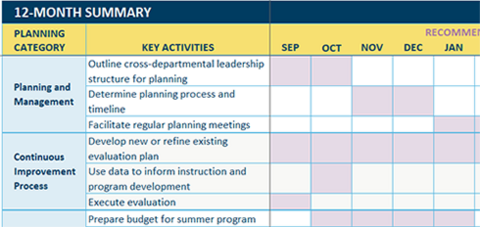Breadcrumb
- Wallace
- Toolkits
- Summer Learning Toolkit
Summer Learning Toolkit

Student Recruitment & Attendance
RAND found that students needed to attend at least 20 days over the course of the summer program to experience academic benefits. So what kinds of programs do students and families like? A variety. RAND found that the two districts with the highest average attendance rates included one that looked like the school year and one designed like a camp. Timing, messages and messengers were all found to be critical components of a successful student-recruitment effort.
Programs should communicate with families early and often, leading right up to the first day of the program, and use accurate messaging. Districts with the lowest no-show rates made personal connections with families in their program reminders, including handwritten notes from teachers and phone calls from district and site leaders.


It’s important that all front-line staff at school sites — from administrative staff and attendance clerks to after school coordinators — are properly trained on all summer-related recruitment and attendance taking procedures. They can make a big impact on a family’s commitment to bring their child each and every day to our summer learning programs. In Oakland, we run numerous professional development sessions for site-based staff to ensure that summer learning recruitment is prioritized at every school site across the district.
— Julie McCalmont, Coordinator, Summer Learning, Oakland Unified School District, Oakland, California
Example Milestones for Student Recruitment and Attendance

Understanding and reaching your audience
It’s important to understand your audience and develop a program and marketing messages that appeal to their priorities and values.

- Go to the source: Talk directly with parents to understand what they need to know to make a decision about signing up your child for your program.
- Don't reinvent the wheel: Use the Summer Learning Recruitment Guide for sample messages. Craft a message that describes the need your program meets for students and families, how they will benefit and what’s unique about it.
- Have fun: Showcase field trips, high-quality enrichment and other rewards for participation as a “hook” for students and families.
Related Resources
Tip Sheet - Promoting Student Participation and Positive Experiences
Best practices for attendance, family outreach and site climate
Samples - Summer Program Catalogs
Program descriptions, enrollment info and key contacts for families and staff
Sample – Pittsburgh Online Registration Form
Enrollment form for students, including enrichment options
Sample - Pittsburgh Pre-Summer Mailer
Pre-Summer Mailer includes details on the program schedule, attendance expectations, transportation, dress code, meals and other services.
Keep your attendance up with a welcoming program and caring staff. Visit Site Climate for ideas.
Creating strong attendance systems
For students in a five-week summer program to receive RAND’s recommended 25 hours of mathematics and 34 hours of ELA instruction, the program should aim for a minimum rate of 80 percent attendance. This high bar requires clear attendance policies and tracking.
- Be upfront: Set clear expectations in application and orientation materials that attendance is expected during all weeks of the program.
- Reach out: Assign someone at each site to call home when students are absent.
- Collect data: Track "no-shows" as well as daily attendance to spot issues and help plan for next year's program. Check out the Boston Attendance Tracker example.

Related Resources
Sample – Boston Summer Attendance Tracker
Attendance-tracking system to ensure consistency across sites and enable real-time data analysis
Developing your plan with the Summer Planning Calendar
Related Resources
Tool - Summer Planning Calendar
Comprehensive to-do list by month and topic paired with expert guidance
GET THE LATEST UPDATES

